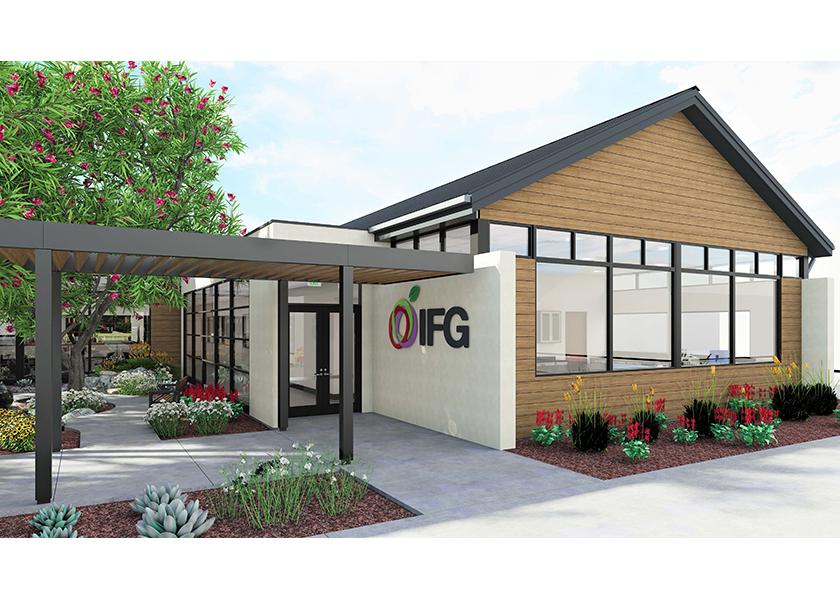A new breed: IFG invests $14M to become world leader in fruit varieties

On an ambitious mission to become the world’s leading provider of fruit varieties, IFG, or International Fruit Genetics, is on track to open a $14 million state-of-the-art research breeding campus in McFarland, Calif., in fall 2023.
The Packer recently had the opportunity to take a virtual tour of the 160-acre campus, which will include greenhouses, laboratories, vineyards and orchards focused on the natural breeding of cherries and table grapes.
“We have affectionately named the new research and development campus we're building, ‘Fruit Works IFG Discovery Center,’ said Andy Higgins, IFG CEO. “It’s really reflective of what we believe our role is in the industry in supporting the innovation and advancement of fruit breeding across multiple species of fruit.”
IFG boasts an impressive resume. The company has more than 80,000 acres planted globally with varieties under license. Serving major markets in Europe, North America and Asia, IFG operates in 18 countries and has about 1,300 licenses in table grapes, 48 patented table grape varieties, 10 patented cherries and a patented raisin variety.
The new discovery center and office headquarters represent IFG’s progression from a startup to a global leader, said Higgins.

“We're the new kid on the block,” said Higgins of the 22-year-old company. “We have gone from a startup with no presence in the marketplace to now being the world's largest table grape breeder — and soon to be the world's largest cherry breeder by number of hectares under management.
“This campus represents our vision for the future,” continued Higgins. “We know the industry is looking for solutions to challenges, which requires a greater investment in new ways to also help consumers.”
IFG was founded on the notion of inspiring the consumer, says Higgins, which differs from other breeding companies that typically focus on the agronomic aspects — tonnage, yields, ship-ability and more.
“We focus first on the consumer. We want to inspire them by creating a flavor revolution,” he said. “We also know that the growers, shippers, marketers and importers all have to be successful, so we can't just introduce a variety that’s cool and tastes good without also ticking the boxes for the rest of the marketplace.”
Defining table grape tastes
Further to its mission to guide the industry and consumers alike in the discovery of fruit varieties, IFG has developed easy-to-digest flavor profiles for table grapes.
The company has created a “Family of Flavors” chart that categorizes grapes into five primary flavor profiles including, tropical/fruity, toffee, muscat, exotic/spicy, and sweet neutral.
“The breadth of flavors across the varieties is so great. There are so many options, we wanted to simplify it and the message for consumers,” said Higgins, who added that over half of the consumers IFG surveyed in creating the profiles said that they're “looking for a grape that tastes like a grape.”
“So, we're trying to improve that eating experience with thinner skins and crunchier textures or a juicier mouthfeel, but not by wooing them with something really unusual from a flavor perspective,” he said.
As a result of consumer feedback, IFG has focused on its sweet neutral program, said Higgins. “But the other four flavors helped to round out interest in the category and give the consumer a reason to come back to the retailer,” he added.
IFG sees the flavor profiles as a merchandising and consumer education tool for retailers. With so many grape varieties in the world, this program is designed to simplify the purchase process for consumers and the merchandising and display of grapes at retail, said Higgins.
To continually engage consumers, retailers also need a year-round supply of grapes. Recognizing this, IFG employs a Northern-Southern Hemisphere sourcing strategy that ensures a 52-week-a-year supply of fresh product.
From farmhouse to fabulous
IFG’s virtual tour also included a bit of history. The company’s original office headquarters was a farmhouse in Delano, Calif., once owned by IFG shareholder Jack Pandol’s grandparents. The location is also the birthplace of Cotton Candy grapes, said Higgins.
“It is our humble beginnings and we're quite proud of it, but as we transition to the future, we also realize that we've outgrown that facility and we've outgrown the capabilities and what we can achieve on our 80 acres, so we're more than doubling our size,” said Higgins of the move to the new campus.
Fruitworks is an investment in innovation and the future.
“We know that the challenges of the past are not going to be the same as the challenges of the future, so we’re looking at this $14 million state-of-the-art campus dedicated to breeding and research very comprehensively — from pure research, like learning about the science of the plant, all the way to the consumer.”
The new facility is also intended for consumer education. It will include an on-site testing location, where IFG can conduct blind consumer panel taste tests to gain feedback and insights into varieties, flavor profiles and textures, with the goal of better understanding what consumers are looking for in fruit.
“One of the goals, and you'll hear us say time and time again, is to shorten the distance from the consumer to the breeder because we know that we have to have an ear and an eye to the marketplace,” said Higgins. “This ensures that there's a vibrant future for the categories of table grapes and sweet cherries, raisins and all sorts of other crops for the future.”
Breeding for climate change
In tandem with accelerating the creation of new varieties, Higgins expects the new facility will allow for the development of varieties designed to thrive in an ever-changing world.
“Over the last, I'd say about 10 years, there have been some major game-changing developments in the world of plant breeding, and this new facility is going to allow us to tap into some of those and greatly expand the type of work that we do,” said Higgins.
One game-changer is the research IFG is doing to address existing and future challenges, such as climate change.
As an example, IFG has developed “low chill cherries” that allow the fruit to be bred in several new environments and geographies including Israel and Egypt.
“Climate change, pandemics and world events today are necessitating a new type of fruit — varieties that can withstand extreme heat, less water and long shipping times, yet still look and taste spectacular on store shelves,” said Higgins.







